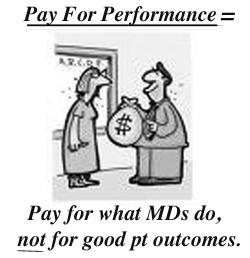
Blame for our healthcare nightmare has recently been aimed at the doctors: inadvertently by Dr. Atul Gawande in the New Yorker magazine and intentionally by Peter Orszag of the Federal Budget Office on Charlie Rose (6/15/09).
Why do doctors "perform" inappropriately? That is, why do they over- or under-use technology? Why do patients insist on technology? Because incentives affect human behaviors. Health care providers are human, and so are patients.
The Obama Administration is considering implementing the pay-for-performance approach initiated by the British National Health Service (NHS). If you read the early experience reported by the NHS (which the Washington administration obviously has not), you will see the problems the NHS has discovered with this badly flawed idea.
Before going along with pay-for-performance, ask yourself three questions.
- What outcomes do you want?
- What behaviors will produce the outcomes you want?
- Remembering that "we get what they reward," what does health care reward?
What outcomes do we want?
The outcomes that health care carefully tracks are: dying; having an adverse impact; length of wait in the ER; filing bankruptcy because of medical bills; and lawsuits. These are precisely the outcomes we do not want.
I apologize in advance for the following double negatives but they make a point. Our preferred outcomes from health care are not: not dying; not filing bankruptcy; not having a complication; not filing a lawsuit.
Our preferred outcomes from health care are positives: living a long time; being healthy; and quick as well as full restoration of our health and function when we get sick.
What behaviors should they reward?
Incentives are tools to encourage or discourage behaviors. Whichever behaviors get us the outcomes we want are obviously the ones to which health care should offer strong incentives.
Which behaviors do they reward or punish?
What are the incentives -- rewards or punishments -- that the current system uses to direct behaviors of health care people?
- For doctors and nurses, there are incentives to be efficient, which translates to the least time spent with any one patient. They are punished for bad outcomes regardless of whether they made an error or not, and for non-compliance with regulations.
- For insurance company executives, there are huge rewards for generating profits. They do this by NOT spending money, which translates to delaying or denying services. There are no punishments.
- Elected officials, both State and Federal governments, seek only one reward: getting re-elected. All decisions and behaviors are directed toward this goal. There are no punishments for bad professional decisions or outcomes. Punishments are reserved for bad personal choices caught on camera (think Marc Sanford and Rod Blagojevich).
- For regulators, there is a very powerful incentive to expand the bureaucracy: this provides job security and advancement. There are no penalties for bad decisions or bad outcomes.
Pay-for-Performance
Pay-for-performance means that hospitals and doctors will get paid (rewarded) for what they do, and not paid (punished) for adverse outcomes. In that system, why would any provider ever agree to care for a diabetic smoker, a patient with colon cancer, or a person with liver cirrhosis? Can you imagine a better way to make health care people avoid absolutely all risks, even when the riskier plan might be better for the patient?
Some consider risk a bad thing in health care, but only those who wish to stay in the dark ages of medicine. How do you think health care discovered childbed fever; cured childhood leukemia; developed arterial stents; created Lipitor; and 'found' the catheter and the laparascope? Answer: by talking risks, reasonable ones but medical, financial, and personal risks nonetheless.
What should health care pay for (reward)?
Pay-for-performance rewards an activity rather than a result or an outcome. Remember the aphorism what they reward is what we get? With pay-for-performance, we get performance. With "pay-for-outcome" (which does not presently exist), we get what we want: health.
Healthcare should pay for [reward] what we want: healthy outcomes.